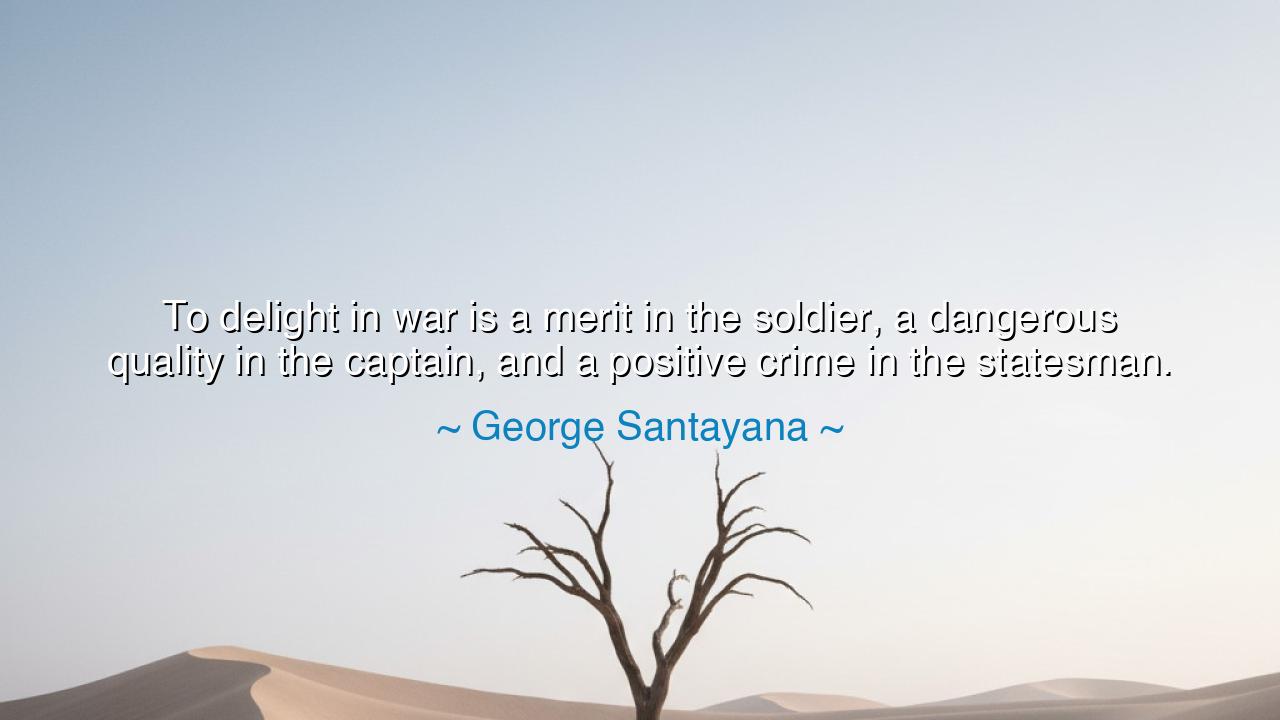
To delight in war is a merit in the soldier, a dangerous quality
To delight in war is a merit in the soldier, a dangerous quality in the captain, and a positive crime in the statesman.






When George Santayana declared, “To delight in war is a merit in the soldier, a dangerous quality in the captain, and a positive crime in the statesman,” he was speaking with the gravity of one who had gazed deeply into the nature of power and conflict. His words draw a boundary between the roles of men in war, showing that what is praised in one may become ruinous in another. For in the common soldier, a fierce joy in battle is courage; in the captain, it may become recklessness; but in the statesman, who bears responsibility for nations, it is nothing less than a betrayal of humanity itself.
The ancients knew this truth well. The warrior Achilles burned with delight in battle, and for this, he was called a hero. His rage was a weapon, and in him the Greeks found strength. But when leaders such as Agamemnon delighted in war, it brought quarrels and chaos, weakening the cause. And when kings and statesmen throughout history have lusted for war itself, entire peoples have been cast into ruin. Santayana’s wisdom speaks across ages: the higher one rises in responsibility, the more dangerous becomes the passion for war.
History provides us with examples carved in fire and blood. Consider Napoleon Bonaparte, who as a young general thrilled in the clash of armies and astonished Europe with his victories. In his early campaigns, his delight in war brought merit and brilliance. But when he ascended as emperor, this same delight became peril. His hunger for battle consumed nations, left millions dead, and ended in his own downfall. What had once been a strength in the soldier became a crime in the statesman.
By contrast, think of Abraham Lincoln. He presided over a nation torn by civil war, yet never once delighted in the bloodshed. With heavy heart, he acknowledged the necessity of conflict, but his words carried sorrow, not joy. He bore the weight of war as a burden, not a prize. And in this restraint lay his greatness: that even as he commanded armies, his heart remained with peace. He embodied the truth that for a statesman, delight in war is not virtue but vice.
The heart of Santayana’s teaching lies in the balance between duty and desire. For the soldier, to desire battle is to stand firm when fear beckons to retreat. For the general, that same desire must be tempered with caution, lest bravery become arrogance. And for the statesman, desire for war must be eradicated altogether, for his duty is not to glory but to the people, to the land, to peace. The greater the power, the greater the demand for humility.
The lesson for us is eternal: passion must always be guided by wisdom. What may be admirable in one station of life becomes destructive in another. The child may delight in play, the soldier in battle, the artist in creation — but the leader, entrusted with the lives of many, must learn restraint. For he who delights in war as policy is not a servant of the people but their destroyer.
In practice, this means cultivating discernment in our own lives. Ask yourself: What delights drive me? Where are they virtues, and where may they become vices? Learn to channel passion into courage when duty demands it, but also learn to restrain passion when responsibility calls for caution. And above all, when entrusted with power over others, let peace, not glory, be your highest aim.
Therefore, let us remember Santayana’s wisdom: delight in war may be a merit in the soldier, but it is a crime in the statesman. The measure of greatness is not in how fiercely one can fight, but in how wisely one can lead. Let courage serve in battle, but let wisdom and restraint govern in peace. For in this balance lies not only the safety of nations, but the survival of humanity itself.






TDvi tran thi diem
This quote invites a reflection on accountability. Could it be that delight in war is only morally acceptable when one directly bears the consequences? It also makes me think about how the perception of virtue or crime changes with responsibility. I’m curious whether this principle applies beyond war, in other fields where personal excitement or ambition might be harmless at lower levels but disastrous at higher ones.
HHHe He
I feel intrigued and unsettled by the notion that the same trait can be virtuous, dangerous, or criminal depending on role. It makes me question modern military and political leadership—how do societies ensure that those in power don’t let personal enthusiasm for conflict lead to unnecessary suffering? I’d like to discuss historical examples where leaders’ attitudes toward war had catastrophic consequences, despite appearing justified in their context.
BVTran Ha Bao Vy
Reading this raises questions about human nature and authority. Why is it considered commendable for a soldier to enjoy war, yet dangerous for a captain and criminal for a statesman? I’d like to explore whether this reflects inherent responsibilities at different levels of power, or if it critiques how detached decision-makers can manipulate the horrors of war for personal or political gain.
NHNgoc Hien
This statement makes me think about the moral complexities of war. It suggests that context changes the ethical weight of one’s attitude toward conflict. I wonder, though, how do we define when delight in war shifts from a personal virtue to a societal crime? Could this perspective help in evaluating historical leaders and their decisions, and what lessons might it offer for modern statesmanship and military ethics?